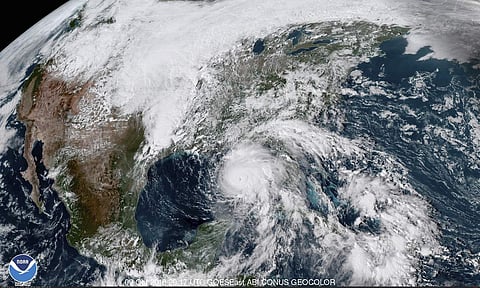

WASHINGTON: Hurricane Michael, which tore into Florida on Wednesday, went in just two days from tropical storm status to a Category 4 hurricane, on a scale with a maximum of five.
Here are some figures which illustrate the power of Michael on the continental United States and which "took forecasters by surprise," according to Phil Klotzbach, a research scientist in the Department of Atmospheric Science at Colorado State University.
"This came out of nowhere, developed on a weekend so it didn't really get much attention at all until basically yesterday," he said.
Wind speed
Michael hit Florida with wind speeds of 155 miles per hour (250 kilometers per hour), placing it almost into Category 5 scale, which starts at 157 mph.
Never in recorded weather history has a hurricane hit the mainland United States at such a speed in October, the month marking the end of the June to November hurricane season.
Looking at the entire hurricane season, Michael had the strongest winds since 1992 and Hurricane Andrew.
Only two other storms in recorded American weather history -- that is, since 1851 -- had stronger winds. They were in 1969 and 1935.
Pressure, a better measure
Meteorologists use another measure to evaluate hurricane intensity: central pressure.
This is preferred by Klotzbach, who explains that it is more precise for historical comparisons because it is measured precisely by an airplane flying in the middle of the storm's eye, whereas "wind is going to be different everywhere along the hurricane."
"The pressure gives an idea of the size of the storm," he said.
Measured in this way -- the lower the pressure the stronger the hurricane -- Michael was the most powerful since Hurricane Camille in 1969.
How much damage?
In any case, no matter how you measure it, Michael is among the most powerful hurricanes in recent memory along with Camille in 1969, Andrew in 1992 and Katrina in 2005.
The calculation changes if you take into account Puerto Rico, the US island territory in the Caribbean that was devastated by Hurricane Maria last year. The death toll was revised to 2,975 fatalities, either in the storm itself or later as the health care and utilities grids failed.
In terms of damage the most costly year was 2017, when besides the Caribbean several US coastal states were hit by powerful hurricanes that moved slowly and dumped record rainful for days.
Major cities such as Houston were flooded, causing as much as $300 billion in damage, according to estimates.
The bill for 2018 is not yet known. It was a relatively calm year except for hurricanes Michael and Florence last month.
In the case of Michael the damage will be mainly from wind rather than rain.